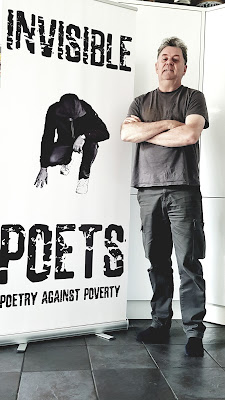Yesterday I was in the studio recording a series of short radio shows in my Poets Corner slot for CrossRhythms Radio. The show is divided into two short sections with a music track played in between. In the first section I provide some background and context for my poem choice, and in the second section I perform the poem. It's simple but effective and the shows go out every weekday afternoon.
In one of my shows yesterday I talked about experimental poetry and told the story of how I became interested, and then inspired by avant garde poets and writers. Here's the story again for those many of you who will never get the chance to listen to the show.
I was in my late teens, and had been writing poetry for a short while during my school years. Now in my first job at a local college, I was seconded for a week or so to work in the college library. It was quite a large library in several floors, and the book stacks were huge. One of my tasks was to preserve some of the paper back books by removing their covers, and then rebinding them in hard covers, with the original paper outers incorporated into the new cover. It was fun, although fiddly, and I always managed to get my fingers covered in glue.
During this time, the library was disposing of many of its old stocks of books. These included poetry and other literature. I spotted a pile of old poetry books and asked one of the library staff what was happening to them. She replied that they were being thrown out, and that if I wanted any I should just take them. I carried a boxful home with me, and I still have most of them in my collection.
Some that caught my eye included works by e. e. cummings, Charles Bukowski and Philip Lamantia. These great American poets wrote amazing out-of-left field poetry that left me gasping for breath. I never knew that the English language could be manipulated in such inventive ways! Then I read the work of Welsh poet Dylan Thomas, who created vast lyrical landscapes of metaphors, similes and wordplay that inspired me even more.
Soon I began to write in similar ways, not in blind slavish copying, but through experimentation and trial and error. I began to perform my new experimental poetry live, and got more positive responses than I did negative ones (you'll always get both). I'm now at the point in my poetry life where I feel I can push the boundaries continually to try to find new ways of experessing myself and new ways of manipulating the English language to create new wordscapes.
My interactive textbook Creative Deviance and more recently my poetry collection eXp exemplify this creative risk taking and showcase what I have found to be possible. I hope in time these books will inspire poets to push their own boundaries just as cummings et al inspire me to push my own.
Steve Wheeler
Photo (c) Wheelsong Books Ltd
SPECIAL OFFER: If you purchase a copy of Creative Deviance directly from Wheelsong Books: wheelsong6@gmail.com you will also receive a copy of eXp absolutely free.


































